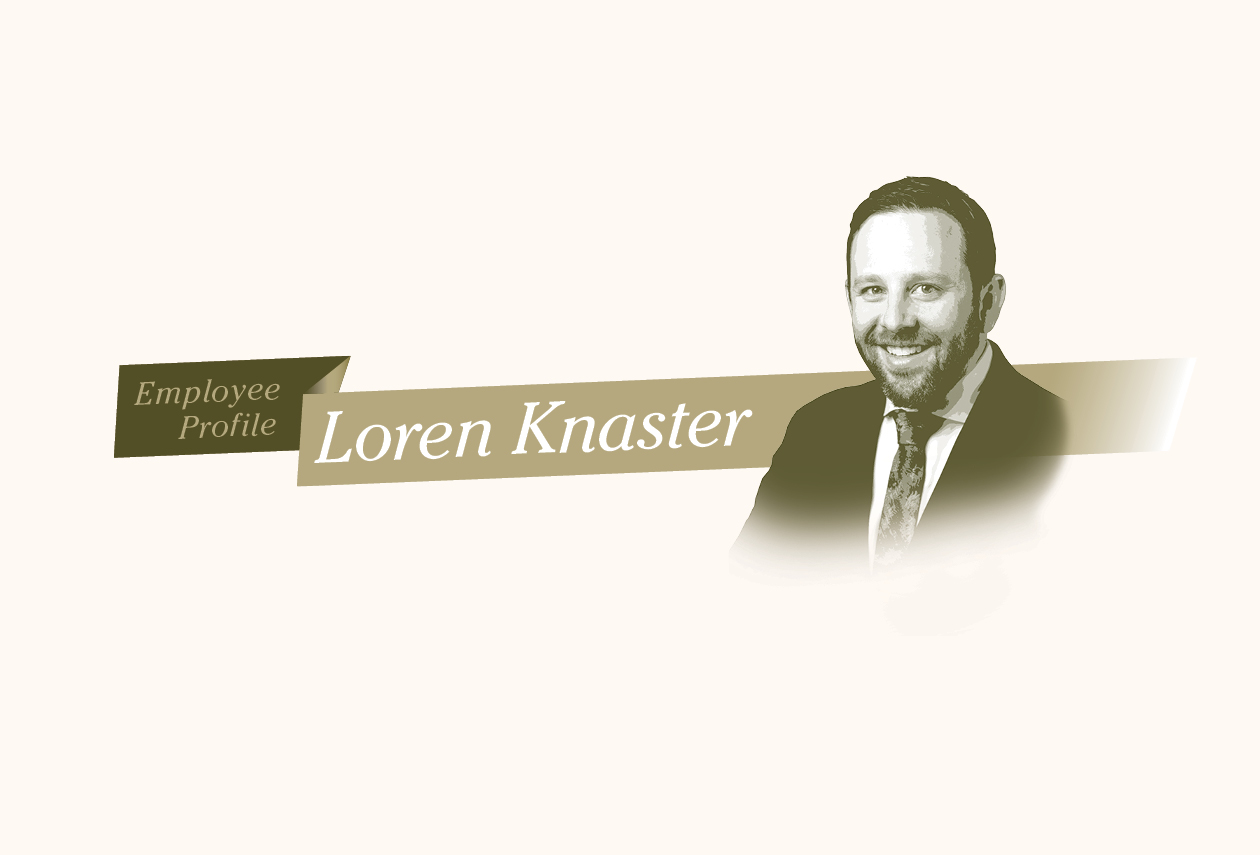Our Employee Profile series continues with this installment, featuring Loren Knaster, Partner and Wealth Advisor in our Denver office. We met for a virtual interview to talk about his personal story, including why he bleeds Bronco blue and orange, what his initial career aspirations were, and how his background in both journalism and conflict resolution play into his current role as an advisor.
Kate Demet: Let’s start with some conversation about your deep roots in Colorado. I seem to recall you’re a fourth-generation Coloradan? I know from my years of living out there how rare it is to even meet someone who’s originally from Colorado, much less someone with such a rich family history there.
Loren Knaster: That’s exactly right. In fact, my wife, Laura, is also fourth generation so our son is now a fifth-generation Coloradan. I love to brag about it, but outside of our family, nobody really seems to care.
KD: Ha! Well, I definitely appreciate how rare it is. What are some of the things you love most about being a Coloradan?
LK: There’s all the stuff that Colorado is known for—the outdoorsy lifestyle, the mountains, the weather, and the overall vibrancy and health of a lot of the people that live here. Sure, that’s all true, but I don’t think about it that way. For me, it’s home. My family has a strong connection to the Jewish community here, which is pretty tight-knit. I’ve also been a huge supporter of our sports teams from a very young age. For my fifth birthday, my grandparents gave me season tickets to the Broncos games, where I got to sit in between the two of them. So, from five years old until I went to college, I went to every Bronco game and tailgated with my grandparents. I almost didn’t want to leave for school, just for that reason alone.
KD: That’s amazing—what incredible memories. And yet, you not only decided to go away for school, but you moved all the way across the country. Why did you choose Syracuse University?
LK: Syracuse was the only school I applied to, the only school I ever wanted to go to. It has a world-famous journalism program and an amazing number of famous sportscasters that have come through that school. And I always thought that I was going to be a sportscaster; I had complete tunnel vision about that. So, I applied for early admission, got in, and that was that. Once I got there, I was as involved as you could possibly be on all the journalism fronts. I was our football, basketball, and lacrosse announcer, and I got to travel with the teams to do that. Two of my roommates and radio station colleagues from college are now pretty famous sportscasters. One of them is Jason Benetti, who does play-by-play for the Chicago White Sox. In my biased opinion, he is the most talented announcer in the country. So, I had lots of friends that all made it, but I didn’t.
KD: Well, wait a second—you got a start in the industry, right? I saw in your bio that you were a sports reporter for WPBN-TV. What’s the story behind that? What changed your mind about pursuing it long term?
LK: Fair enough. I think about this a lot. So, after graduation, I came home to Denver and sent my resume tape to any open job I could find across the country. I really wanted to focus on storytelling more than play-by-play, so I was pursuing local news outlets. Finally, I got a call from a local station in Traverse City, Michigan, and went through the interview process, after which they offered me a three-year contract, sight unseen. I’d never even been to Traverse City. They called on a Friday afternoon while I was on the golf course with my brother and asked if I could start on Monday. So, we went home and packed up my car, and I hit the road.
At first, it was great. I got to be on TV, I was a local celebrity, people bought me drinks at the bar. But it’s a hard life. Our viewing area went three hours in every direction of Traverse City, so I would spend half of my time just driving from city to city to cover stories. And with Michigan winters, racing around the state could get treacherous. But you had no choice—if you couldn’t make it in time for your live shot, you didn’t have a job.
Another big obstacle was that it was really difficult to make a living. My salary was so low that I couldn’t even pay my rent. I got a job at Outback Steakhouse, where I could wait tables on my two days off. But when I told my news director, he put the kibosh on that, saying I couldn’t be on the news five nights a week and slinging steaks across town the other two.
KD: (laughs) He had a point! I can see how that wouldn’t reflect well on the station.
LK: For sure. But I was broke, and the job was a real grind. A lot of the news business is predicated on negativity, and even though sports is on the lighter side of things, the environment wasn’t a good fit for me as a pretty positive person. So, I ended up returning to Denver and pieced together some freelance broadcast opportunities until I decided to go back to school for my master’s degree.
KD: And you chose to get your degree in conflict resolution. What drove that decision, or what did you have in mind for your next career move?
LK: Well, I didn’t really know what I wanted to do, but I researched this program and it really spoke to me. And then the way it all fell into place is basically kismet. I needed to make some money while I was in school, and I was presented with an opportunity to sell life insurance. I didn’t really know what to make of it, but I knew a guy from my synagogue’s softball team worked in the world of money, so I asked him for his perspective. That guy was Seth Davis, who not only talked me out of that job but also told me that he needed some help with his growing financial advisory practice. He offered to bring me on as a paid intern. Long story short, I started working with him in 2008, eventually transitioned to a full-time role when I finished graduate school, and then came along with him to RMB in 2011. That’s really when I decided I was going to pursue becoming a financial advisor; joining RMB opened a lot of doors. So, I went on to get my CERTIFIED FINANCIAL PLANNER TM designation and then became a Chartered Financial Analyst, too. In fact, getting my CFA might have been both the most challenging and most rewarding process of my life.
KD: Wow, and that all started based on a connection from your softball league. You’ve obviously done a lot of work to build your credentials in this industry. I wonder whether your experience as a reporter and your study of conflict resolution somehow prepared you for your role as an advisor?
LK: Without question, in a few ways. First, storytelling is incredibly important in being able to take complicated information and speak to clients about it in a way that’s compelling and easy to understand. I feel like that’s a huge part of what I do every day. Also, I lean heavily on the skills that I learned about interviewing and being able to ask the right questions, get to the truth, get to the bottom of the situation—especially at the outset of a client relationship. And then conflict resolution is really all about problem solving and negotiating. A strategy that I use is to acknowledge that everybody’s financial situation is a giant, unique puzzle —and we can rise to the challenge of solving that puzzle together. So, in a weird way, it all led me to what I do today, which involves a lot of high-level problem solving, helping people through conflict, interviewing, listening, educating, and guiding. I love it.
KD: Fascinating—that itself is a great story!
LK: Absolutely. The last thing I would add on the storytelling front, which is another thing that’s super cool about my job, is that I get to hear amazing stories from so many interesting people. I work with clients from different parts of the world who have such diverse backgrounds and ways that they’ve been successful. In many cases, I’m dealing with people who are the cream of the crop in their trade, and I love learning about what they do and how they experience life through their unique lens. It’s really exciting.
The opinions and analyses expressed in this communication are based on RMB Capital’s research and professional experience and are expressed as of the mailing date of this communication. Certain information expressed represents an assessment at a specific point in time and is not intended to be a forecast or guarantee of future results, nor is it intended to speak to any future time periods. RMB Capital makes no warranty or representation, express or implied, nor does RMB Capital accept any liability, with respect to the information and data set forth herein, and RMB Capital specifically disclaims any duty to update any of the information and data contained in this communication. The information and data in this communication do not constitute legal, tax, accounting, investment, or other professional advice. An investment cannot be made directly in an index. The index data assumes reinvestment of all income and does not bear fees, taxes, or transaction costs. The investment strategy and types of securities held by the comparison index may be substantially different from the investment strategy and types of securities held by your account.
Certified Financial Planner Board of Standards, Inc., owns the certification marks CFP®, CERTIFIED FINANCIAL PLANNERTM, and federally registered CFP (with flame design) in the United States, which it awards to individuals who successfully complete the CFP Board’s initial and ongoing certification requirements. The Chartered Financial Analyst® marks are the property of the CFA Institute.







